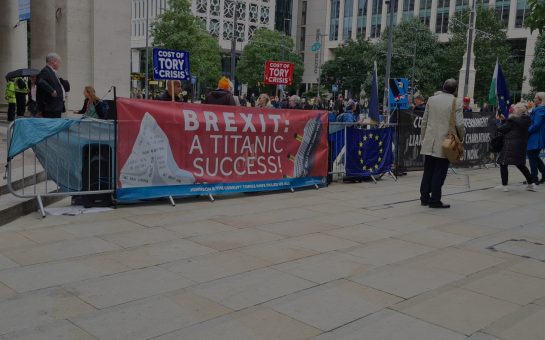The day is upon us, pollsters have desperately thrown numbers into spreadsheets for the last time and the voting boxes have been dusted off for their moment of glory and, still, the Brexit debate is as fearsome as ever.
One issue key to the debate, that hasn’t received the attention that it might be expected to gain in the lead up to the referendum vote this Thursday has been civil rights and specifically those of the LGBT community.
Britain’s record on LGBT rights over the past decade and a half has been a positive one, perhaps going some way to making amends for its poor record prior to that.
However, the question is: how would leaving the EU affect LGBT rights in Britain and in other EU countries too?
Director of Out & Proud – an LGBT group campaigning in favour of leaving the EU – Adam Lake said: “LGBT rights in the UK are among some of the best in the world, this is because we are a liberal country that elects liberal governments to enact liberal legislation.
“Democracy is key to this, because it means that if a party came into power that did not value LGBT rights the British public, of whom 84% believe in equality according to the EU commissions own figures, would vote them out.”
“Across Europe the case is less consistent, with countries such as Hungary actively holding back equality for all member states through use of a veto.
“As the EU becomes more closely integrated we think it important the LGBT rights are entrusted to the British public and not the EU consensus.”
Of course, EU legislation isn’t the only way that countries can introduce laws into their country and Hungary has no veto on the passage of laws in other countries outside of the European Parliament.
Furthermore, some may disagree with Adam’s point on the EU’s failure, pointing out that countries, such as Italy where the catholic church holds a lot of sway, that had previously subscribed to so-called traditional values have since introduced greater equality for LGBT people under the EU’s watch.
All new members of the EU must sign up to the European Convention on Human Rights, which itself lays out a whole host of rights relevant to LGBT rights.
The EU also allows challenges against discriminatory domestic laws, in court, even by individuals outside their home countries.
Simon Millson co-ordinator of pro-remain group, LGBT for Europe, also stated a case for the UK remaining so that it can exercise greater influence on other countries whose civil rights are not up to scratch.
He said: “The EU works to make the world a safer place for LGBT people, promotes LGBT rights and equality across Europe, and sets a minimum standard by which all member states of the EU treat LGBT people.
“The EU is committed to improving the lives of LGBT people its member states.”
Last week, the 28 member states agreed to work against ‘any discrimination’ against LGBT people and to ramp up pan-European efforts on equality.
However, Lake questions whether the worth of such commitments.
At present there are eight EU countries that have a constitutional ban on same sex marriage while a lack of progress on hate crime legislation is also an issue in a number of nations.
He said: “The EU does a very good job at making all of the right sounds when it comes to LGBT rights but the reality is that real equality is just not forthcoming in many countries.”
This week we saw the EU celebrate with much fanfare a commitment to LGBT rights but yet again this is another example of the EU tapping itself on the back for airing positive sentiment on the issues whilst in reality making no solid commitments that help LGBT people.”
The rights enjoyed by LGBT people in Britain are without doubt among the best in the world and in Europe too, leading some to believe that the UK has little to gain in this area from continued membership.
Lake in particular is sceptical and believes that the EU’s continued policy of expansion will only see the UK shrink into a larger body of different nations, each of which hold different goals.
He said: “It is a lovely idea that by staying we can encourage other EU members to support LGBT people but the reality is that as members we have failed to have any influence on this issue in the past, how anyone could possibly believe we would have more influence if we reluctantly decided to stay?
“We are one on 28 different members, and as that number grows our influence will dissipate. Therefore I believe that staying in the EU in order raise the issue of LGBT rights would be a waste of time.”
However, LGBT rights are a relatively new thing even in progressive nations. Britain only decriminalised male homosexuality in 1967, some 34 years after Denmark did so and 23 years after Norway.
In some cases Britain required outside help to promote expansion or in some cases the initial granting, of LGBT rights. For example, the British Armed Forces only allowed LGBT personnel to be open about their sexuality after a challenge at the European Court of Human Rights in 2000.
Meanwhile the age of consent was only equalised to 16 in 2001, again, after a ruling by the European Court of Human Rights.
Britain became the ninth EU country to legalise same-sex marriage 2014, 13 years after the Netherlands lead the way in 2001.
This perhaps goes to show that even though some countries’ record on LGBT right are currently poor, things do not remain the same and, with a push in the right direction, great change can be achieved across a relatively short period of time.
On the matter, Millson said: “Britain has come a long way but we had a long way to catch up, and much of that only happened in the 21st century – that’s only within the past 16 years – and some of the change was achieved with Europe’s help, either through the EU or European Court of Human Rights.
“The LGBT community has fought hard over the past 50 years to transform the lives of millions of LGBT people in Britain and across Europe.
“We must use our influence to promote LGBT rights across Europe and around the world.
“Britain is best placed to do this as part of the EU, a union that represents 28 countries and over 500 million people, the most populous and prosperous in the world.
“The EU is good for LGBT rights and equality. We’re stronger, safer and better off in the EU.”
Much has been made of how a post-Brexit Britain would look with many spectators have suggesting the result would empower the MPs in the leave camp, fuelling Boris Johnson’s prime ministerial ambitions.
This is a prospect that worries Simon greatly, particularly as a leave vote would also see the UK leave the European Convention on Human Rights leaving the post-Brexit government with the task of re-writing a British bill of rights.
He cites the statistic that, in the 2012 parliamentary vote on gay marriage, 70% of the MPs currently backing the leave campaign voted against the act – compared to 80% of the remain side voting in favour of it.
“The Leave MPs are not committed to LGBT equality. They want to get rid of the European Convention of Human Rights. The Leave MPs are not committed to human rights.
“Our future is not safe in their hands.”
The leave campaign’s sketchy past on LGBT issues is accentuated by the faux-pas on Boris Johnson, who prompted controversy on two high profile occasions with ill-advised comments on LGBT rights.
Lake defended Johnson, however, citing that he took action while in office as mayor of London to ban bus advertisements for so-called ‘gay cure’ therapy and also voting against the then Tory party line to repeal section 28 when he was an MP.
Immigration is another topic that has had a huge impact on debate on the referendum and has been talked about at just about any possible opportunity. One argument made by the leave camp has been that freedom of movement between EU states has unfairly limited migration from elsewhere.
Whether you believe those words as they come from Nigel Farage’s mouth is one thing; however Out & Proud’s website expresses a believe that the argument is based on solid reasoning, saying that LGBT people from outside of the EU are having the door shut in their face due to the UK’s commitments to the EU.
Ultimately, the UK decides its own policy on non-EU migrants, however Lake thinks freedom of movement influences government policy on immigration in less direct ways.
He said: “I am personally a big supporting of immigration and as someone who is married to a guy from Brazil I know just how hard it can be to apply to live and work in this country.
“The way we treat people who want to contribute to our country is a disgrace, and whilst I think it would be unfair to blame this on our open borders policy with the EU, I think it certainly does have an impact when the Home Office is deciding its policies.
I want to see a country that welcomes people, from wherever they come in the world, who want to contribute to this country and whatever the outcome this Thursday I hope to continue that fight.”
The EU’s 2013 guidelines for supporting human rights prioritise action to end discrimination against LGBT people across the world and back this up with funds for campaigners working against homophobic and transphobic violence– many of whom do so at great personal risk.
Therefore, Millson believes, that the EU is the way forward in promoting LGBT rights at home and abroad and though he admits it is not a perfect entity, it is better to try to influence from within.
“The EU is the world’s largest economy and biggest aid donor – it carries a lot of weight in international negotiations, especially with countries that need to improve their human rights.
“Britain leaving the EU would undermine the EU’s influence around the world and Britain’s too.”
Image courtesy of Leave.eu via YouTube, with thanks.


